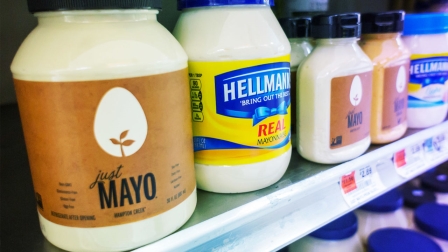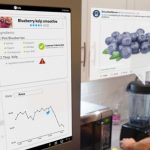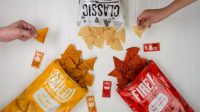The Real Hustle Behind Hampton Creek’s Buy-Up Scheme
When you’re trying to disrupt the food industry and win over supermarket titans, the difference between hustling and a shady scheme can be blurry, as Hampton Creek discovered last week.
The explosive claim that the company propped up sales by buying up jars of its Just Mayo eggless mayonnaise at supermarkets around the country rocked the retail world. In response, company founder and CEO Joshua Tetrick told Bloomberg that the scheme was less about boosting sales than about pulling faulty product off shelves and to perform atypical quality assurance tests.
How the program went from a small operation to pull unsavory products from stores to a $77,000 operating expense may actually have less to do with a plot to fluff up sales and more to do with a need to ensure Just Mayo’s place on store shelves. And it reflects just one part of Hampton Creek’s aggressive modus operandi, which also involved hiring contractors to pose as customers when they called up stores to demand the product.
When jars of Just Mayo first hit the shelves in 2013, there were a lot of problems, Tetrick tells Fast Company. After suffering temperature changes in transit some of the mayo had morphed from a thick gooey sauce, to a murky substance that looked and moved like oil and water. The labels were peeling off from condensation. “It was a disaster,” says Tetrick.
It was at this point, in 2013, that Hampton Creeks began buying up its own mayo. Initially it was to pull faulty product off shelves. At that time, Tetrick says, he was also asking employees and contractors to buy extra product so they could test it. This is the quality assurance practice component of the program that Tetrick has brought up repeatedly in interviews since the Bloomberg story hit. That program eventually morphed into the buy-back program that has become the topic of hot debate.
Shelf Space And Sales
In the packaged food industry, making sure that your product gets on the shelf in a big-name supermarket is key to expanding your brand and landing loyal customers. The grocery business is notoriously cutthroat where major food makers like Kraft, Unilever, and General Mills rule the roost. “We had [some of these bigger companies] saying they want to partner with us and they would say the only way you can get distribution is if you ride with us,” says Tetrick.
Big chain supermarkets will often charge fees for space on their shelves and product advertising. What this means in practice is that powerful brands with big chunks of the market can get more prime positioning in a store than the little guys can. Smaller food product companies are susceptible to being pushed around and settling for less than desirable terms with grocers.
“[Retailers] might price you out, or they might put you down on the bottom shelf where nobody can see you,” Scott Hannah, founder of frozen vegetable purveyor Pacific Valley Foods, said in 2002 Forbes article on Kraft Foods’ takeover of the grocery aisle.
Still, the payoff for even getting on the shelf can be huge and has a snowball effect. It allowed Hampton Creek to push its product to more shelves in more grocery stores both in the U.S. and internationally. But it would never have had that growth spurt if it had been churned off the shelf at Safeway for having an underperforming product.
“If customers don’t pull you off the shelf, you get sent home and that shelf space goes away,” says Steve Blank, an entrepreneur and lecturer at New York University. “And then you panic because there’s almost never a second chance.”
That’s likely why Hampton Creek sent an email to its staff about the importance of having “huge sales out of the gate” at Safeway, as Bloomberg reported. Buying jars of Just Mayo probably wasn’t about generating sales for the company, it was about proving to Safeway that it deserved a place in its store.

It’s not unlike a similar tactic the company used to get on the shelf at other stores. Early on, Tetrick says he had thousands of contractors and volunteers call stores like Whole Foods to ask about Just Mayo and to request the product. “We had at least four different nonprofits work with us,” he adds. Animal rights activists and others pushing meatless diet regimens hopped on board to help. These calls were carried out in various ways, both via contractors reading from a script and posing as customers and through volunteers from nonprofits advocating for the importance of Just Mayo. Again, the idea was to convince a store the product was valuable enough to put on the shelf.
From a financial perspective, Tetrick says, buying its own product did not jolt sales. He says the buy-back program only cost the company $77,000 in total—a small fraction of Hampton Creek’s sales. The company took in $4.6 million in sales at grocery stores (not including sales at Whole Foods) from April 2014 to April 2015, according to market research firm IRI. The following year, Hampton Creek more than doubled the sales it made to $11.8 million, according to the same report. Those figures don’t account for sales at Whole Foods or from food services, which Tetrick claims is Hampton Creek’s main source of revenue. Hampton Creek sells its mayo to 2,300 public schools, 472 universities, and stadiums all over the country.
In July, Tetrick says the company did roughly $8 million in sales and expects to garner $100 million in sales this year. It also has accrued at least $120 million in investor funding to date. With those figures in mind, $77,000 in sales is a drop in the bucket for the company—even early on. Bloomberg’s Olivia Zaleski says the receipts she gathered for her report were not included in Hampton Creek’s accounting of its buy-back program, insinuating that the company may have actually spent more than $77,000 on its own product or at least that the scope of the project is still largely unknown.
Tetrick says that even factoring in the jars of mayo that Zaleski says were unaccounted for wouldn’t deeply impact Hampton Creek’s sales, whether or not they had to do with quality assurance. “Hundreds of jars? Like is that what we’re talking about here?” he says diminishing the argument that buying jars in any way inflated sales of Just Mayo.
“I thought it would give us a little momentum,” he says. “It turned out to have no impact on sales, so it became even more about [quality assurance].”
How Legal Is This?
Since Hampton Creek is a private company, the legality of this situation all depends on what the company disclosed to its investors. If Hampton Creek presented to its investors a valuation that was in part based on its channel partnership with Safeway and didn’t also tell them that they were able to build that relationship by stoking initial sales through its buy-back program, investors could file suit, says Blank. That’s also true if the company didn’t account for its sales in ways that reflected the impact of the buy-back program.
“An honest conversation would have been, look, you were trying to make sure you were staying in the channel and spent 77 grand by basically kicking it back to Safeway by buying your own product,” says Blank. “That is maybe a smart move to save your company from being thrown out of Safeway without giving them a bribe.” Ultimately, this is a private matter. If investors feel the company misrepresented its true revenue at the time of the deal, they could sue or negotiate for more equity, says Blank.
Tetrick counters that the $77,000 that his company spent buying back its own product was such a small amount that it didn’t constitute something worth divulging to every single investor. “When they invest, we have to state material facts,” he says. “There is no investor that thinks this is material.” Furthermore, because the program ultimately didn’t negatively impact Hampton Creek, investors are unlikely to file suit. If anything, the move may have helped buy the mayo purveyor some lead time, before organic sales took off.
“Truly you can’t keep doing this, because eventually you do run out of money to buy your own stuff,” says Blank. “if demand caught up, it was exactly the right move.”
The Startup Hustle
Startups, particular those in the Bay Area, love to talk about disrupting industries. It’s certainly their scrappy tactics that can help them break into sectors beyond the reach of most small businesses. For Hampton Creek, which ultimately doesn’t just want to compete with Hellman’s, but plans on developing and launching a whole batch of plant-based products, getting through the door at big chain retailers is just the price of entry.
And grocers are not Hampton Creek’s only challenge. Hellman’s parent company Unilever sued the startup in 2014 for marketing its Just Mayo as mayonnaise when it doesn’t fit the Food and Drug Administration’s description of the product, which includes eggs. The lawsuit has since been dropped and Hellman’s has launched a competing egg-free product.
Of course, powerful opponents and a need to employ a little marketing savvy and startup scrappiness are no excuse for engaging in shady behavior. This isn’t the first time that Hampton Creek has been called out for its dubious practices.
Whether you think Hampton Creek’s hustle is shady or disruptive, there is a good lesson to draw from the current scandal: Always be transparent with your investors. That way if your company’s unorthodox methods for getting ahead are revealed, you might get some bad press, but at least you’ll still have the support of the people funding you.
Fast Company , Read Full Story
(54)













